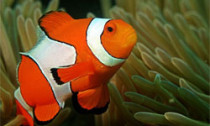
Coral reef fishes exposed to acid oceans lose their sense of smell – and their sense of caution – and are more likely to fall prey to natural enemies, according to new research in Nature Climate Change. The finding is based on observations of the behaviour of four species at a reef off the coasts of Papua New Guinea where natural carbon dioxide seeps out of the rock, and confirms a series of other such studies in the last year.
A cool volcanic discharge in the reef has served as a natural laboratory for years: water in the region reaches an average pH of 7.8. This standard measure of acidity is co-incidentally the level predicted for all the world’s oceans by 2100, as atmospheric carbon dioxide levels continue to rise, according to the Intergovernmental Panel on Climate Change. www.ipcc.ch/
Australian and US scientists observed the fishy behaviour from a boat moored above the reef, and also tested the fish on board the vessel. What they observed was that, away from the volcanic bubbles of carbon dioxide, in conditions of more normal ocean chemistry, damsel fish and cardinal fish seemed able to smell predators and stayed in sheltered places in the reef to avoid becoming prey.
Fish from the waters richer in carbonic acid seemed not to sense the presence of predators, and were more likely to venture into dangerous waters.
Survival threat
After a sudden scare that sent all the fish racing for cover, the fish from the bubble reef ventured forth much sooner. In normal circumstances, such fish spend 80% of their time under cover.
The bubble reef fish spent at most only 12% of their time in hiding. Mortality accordingly was five times higher.
“Their sense of smell was acutely affected in CO2-rich waters in ways that gravely threaten their survival,” said Alistair Cheal of the Australian Institute of Marine Science.
“We were able to test long-term realistic effects in this environment,” said another author, Danielle Dixson of the Georgia Institute of Technology in the US. “One problem with ocean acidification research is that it’s all laboratory-based, or you’re testing something that’s going to happen in 100 years’ time with fish that are from the present day, which is not actually accurate.”
The reasoning is that the change in pH levels disrupts a neuroreceptor in the fishes’ brains and affects faculties or alters behaviour. Similar experiments with Californian rockfish have demonstrated much the same effect.
Acid spreading
But increased acidification of the oceans is also likely to affect shellfish and corals in other ways, and research in the Great Barrier Reef region of Australia has documented a dramatic behaviour change in a jumping snail that suggested impaired decision-making capability as pH levels alter.
Sea water is already 30% more acidic that it was at the start of the Industrial Revolution 200 years ago. The rate of change is at least 100 times faster than at any time in the last 650,000 years.
The bubbling waters of the reef under test are not unique – such localized carbonic acid seeps occur in many places all over the world – and the fact that predators might find easy pickings in such places makes no real difference to population levels in the vastness of the rest of the ocean. But such experiments raise the question: can ecosystems adapt to changing water chemistry?
“Continuous exposure does not reduce the effect of high CO2 on behaviour in natural reef habitat and this could be a serious problem for fish communities in the future when ocean acidification becomes widespread as a result of continued uptake of anthropogenic CO2 emissions,” the authors conclude.












Social Profiles